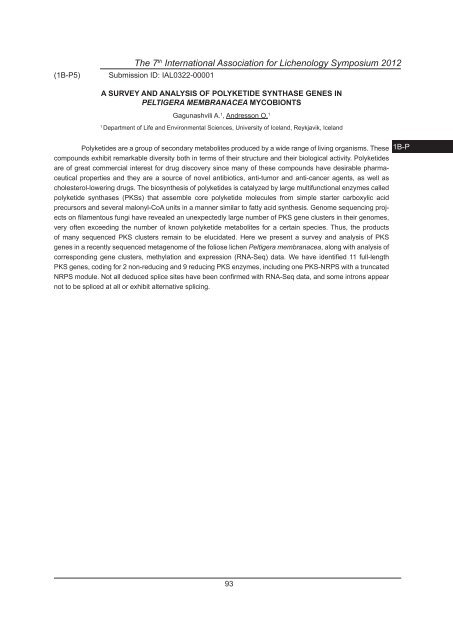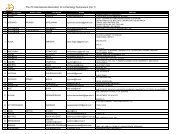- Page 1 and 2:
The 7 th IAL Symposium 2012 Lichens
- Page 3 and 4:
The 7 th International Association
- Page 5 and 6:
Welcome Message The 7 th Internatio
- Page 7 and 8:
Welcome Message Dear IAL7 Participa
- Page 9 and 10:
Report The 7 th International Assoc
- Page 11 and 12:
Opening Address The 7 th Internatio
- Page 13 and 14:
IAL COUNCIL (2008-2012): The 7 th I
- Page 15 and 16:
The 7 th International Association
- Page 17 and 18:
SYMPOSIUM VENUE The 7 th Internatio
- Page 19 and 20:
FLOOR PLAN The 7 th International A
- Page 21 and 22:
The 7 th International Association
- Page 23 and 24:
The 7 th International Association
- Page 25 and 26:
The 7 th International Association
- Page 27 and 28:
The 7 th International Association
- Page 29 and 30:
The 7 th International Association
- Page 31 and 32:
The 7 th International Association
- Page 33 and 34:
The 7 th International Association
- Page 35 and 36:
Scientific Program P14
- Page 37 and 38:
s s The 7 th International Associat
- Page 39 and 40:
The 7 th International Association
- Page 41 and 42:
s s s s s s The 7 th International
- Page 43 and 44:
s s The 7 th International Associat
- Page 45 and 46:
s s s s s The 7 th International As
- Page 47 and 48:
s s s The 7 th International Associ
- Page 49 and 50:
s s s s The 7 th International Asso
- Page 51 and 52:
s s s s s s The 7 th International
- Page 53 and 54:
s s s s The 7 th International Asso
- Page 55 and 56:
s s s s The 7 th International Asso
- Page 57 and 58:
s s s The 7 th International Associ
- Page 59 and 60:
s s s s The 7 th International Asso
- Page 61 and 62:
s s s s s s s The 7 th Internationa
- Page 63 and 64:
s s s s s s The 7 th International
- Page 65 and 66:
s s s The 7 th International Associ
- Page 67:
ABSTRACTS OF CONTRIBUTED PAPERS (OR
- Page 70 and 71:
1 2 3
- Page 72 and 73:
Lichen: from genome to ecosystem in
- Page 74 and 75:
Lichen: from genome to ecosystem in
- Page 76 and 77:
Lichen: from genome to ecosystem in
- Page 78 and 79:
Lichen: from genome to ecosystem in
- Page 80 and 81:
1A-O Lichen: from genome to ecosyst
- Page 82 and 83:
Lichen: from genome to ecosystem in
- Page 84 and 85:
1A-O Lichen: from genome to ecosyst
- Page 86 and 87:
Lichen: from genome to ecosystem in
- Page 88 and 89:
1A-O Lichen: from genome to ecosyst
- Page 90 and 91:
1B-O Lichen: from genome to ecosyst
- Page 92 and 93:
1B-O Lichen: from genome to ecosyst
- Page 94 and 95:
Lichen: from genome to ecosystem in
- Page 96 and 97:
Lichen: from genome to ecosystem in
- Page 98 and 99:
2A-1-O Lichen: from genome to ecosy
- Page 100 and 101:
2A-2-O Lichen: from genome to ecosy
- Page 102 and 103:
2A-2-O Lichen: from genome to ecosy
- Page 104 and 105:
2B-O Lichen: from genome to ecosyst
- Page 106 and 107:
2B-O Lichen: from genome to ecosyst
- Page 108 and 109:
2B-O Lichen: from genome to ecosyst
- Page 110 and 111:
Lichen: from genome to ecosystem in
- Page 112 and 113: Lichen: from genome to ecosystem in
- Page 114 and 115: Lichen: from genome to ecosystem in
- Page 116 and 117: Lichen: from genome to ecosystem in
- Page 118 and 119: Lichen: from genome to ecosystem in
- Page 120 and 121: 3A-O Lichen: from genome to ecosyst
- Page 122 and 123: 3A-O Lichen: from genome to ecosyst
- Page 124 and 125: 3B-1-O Lichen: from genome to ecosy
- Page 126 and 127: 3B-1-O Lichen: from genome to ecosy
- Page 128 and 129: 3B-2-O Lichen: from genome to ecosy
- Page 130 and 131: 3B-2-O Lichen: from genome to ecosy
- Page 132 and 133: Lichen: from genome to ecosystem in
- Page 134 and 135: Lichen: from genome to ecosystem in
- Page 136 and 137: Lichen: from genome to ecosystem in
- Page 138 and 139: 4A-O Lichen: from genome to ecosyst
- Page 140 and 141: 4A-O Lichen: from genome to ecosyst
- Page 142 and 143: 4B-O Lichen: from genome to ecosyst
- Page 144 and 145: 4B-O Lichen: from genome to ecosyst
- Page 146 and 147: Lichen: from genome to ecosystem in
- Page 148 and 149: Lichen: from genome to ecosystem in
- Page 150 and 151: Lichen: from genome to ecosystem in
- Page 152 and 153: Lichen: from genome to ecosystem in
- Page 154 and 155: Lichen: from genome to ecosystem in
- Page 156 and 157: Lichen: from genome to ecosystem in
- Page 158 and 159: Lichen: from genome to ecosystem in
- Page 160 and 161: Lichen: from genome to ecosystem in
- Page 164 and 165: Lichen: from genome to ecosystem in
- Page 166 and 167: Lichen: from genome to ecosystem in
- Page 168 and 169: Lichen: from genome to ecosystem in
- Page 170 and 171: 2A-1-P Lichen: from genome to ecosy
- Page 172 and 173: 2A-1-P Lichen: from genome to ecosy
- Page 174 and 175: 2A-2-P Lichen: from genome to ecosy
- Page 176 and 177: 2A-2-P Lichen: from genome to ecosy
- Page 178 and 179: 2A-2-P Lichen: from genome to ecosy
- Page 180 and 181: 2A-2-P Lichen: from genome to ecosy
- Page 182 and 183: 2A-2-P Lichen: from genome to ecosy
- Page 184 and 185: Lichen: from genome to ecosystem in
- Page 186 and 187: Lichen: from genome to ecosystem in
- Page 188 and 189: Lichen: from genome to ecosystem in
- Page 190 and 191: Lichen: from genome to ecosystem in
- Page 192 and 193: Lichen: from genome to ecosystem in
- Page 194 and 195: Lichen: from genome to ecosystem in
- Page 196 and 197: Lichen: from genome to ecosystem in
- Page 198 and 199: Lichen: from genome to ecosystem in
- Page 200 and 201: Lichen: from genome to ecosystem in
- Page 202 and 203: Lichen: from genome to ecosystem in
- Page 204 and 205: Lichen: from genome to ecosystem in
- Page 206 and 207: Lichen: from genome to ecosystem in
- Page 208 and 209: Lichen: from genome to ecosystem in
- Page 210 and 211: Lichen: from genome to ecosystem in
- Page 212 and 213:
Lichen: from genome to ecosystem in
- Page 214 and 215:
Lichen: from genome to ecosystem in
- Page 216 and 217:
Lichen: from genome to ecosystem in
- Page 218 and 219:
Lichen: from genome to ecosystem in
- Page 220 and 221:
Lichen: from genome to ecosystem in
- Page 222 and 223:
Lichen: from genome to ecosystem in
- Page 224 and 225:
Lichen: from genome to ecosystem in
- Page 226 and 227:
Lichen: from genome to ecosystem in
- Page 228 and 229:
Lichen: from genome to ecosystem in
- Page 230 and 231:
Lichen: from genome to ecosystem in
- Page 232 and 233:
Lichen: from genome to ecosystem in
- Page 234 and 235:
Lichen: from genome to ecosystem in
- Page 236 and 237:
3B-1-P Lichen: from genome to ecosy
- Page 238 and 239:
3B-1-P Lichen: from genome to ecosy
- Page 240 and 241:
3B-2-P Lichen: from genome to ecosy
- Page 242 and 243:
3B-2-P Lichen: from genome to ecosy
- Page 244 and 245:
3B-2-P Lichen: from genome to ecosy
- Page 246 and 247:
3B-2-P Lichen: from genome to ecosy
- Page 248 and 249:
Lichen: from genome to ecosystem in
- Page 250 and 251:
Lichen: from genome to ecosystem in
- Page 252 and 253:
Lichen: from genome to ecosystem in
- Page 254 and 255:
Lichen: from genome to ecosystem in
- Page 256 and 257:
Lichen: from genome to ecosystem in
- Page 258 and 259:
Lichen: from genome to ecosystem in
- Page 260 and 261:
Lichen: from genome to ecosystem in
- Page 262 and 263:
Lichen: from genome to ecosystem in
- Page 264 and 265:
Lichen: from genome to ecosystem in
- Page 266 and 267:
Lichen: from genome to ecosystem in
- Page 268 and 269:
Lichen: from genome to ecosystem in
- Page 270 and 271:
Lichen: from genome to ecosystem in
- Page 272 and 273:
Lichen: from genome to ecosystem in
- Page 274 and 275:
Lichen: from genome to ecosystem in
- Page 276:
1 2 3



